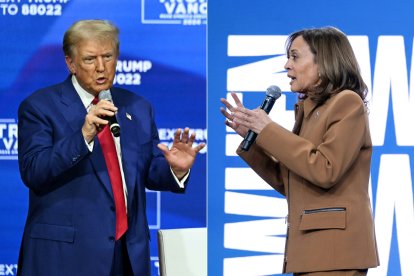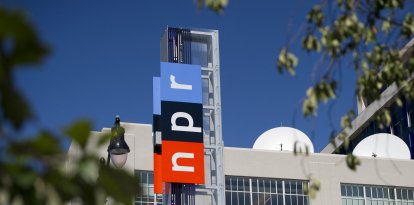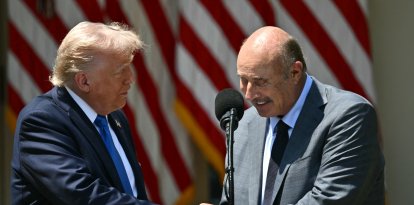Are polls reliable in this election campaign?
Several prestigious pollsters such as Nate Silver denounce that a phenomenon known as 'herding' is taking place to offer similar results for fear of error.

Trump and Harris, during campaign events.
The overwhelming majority of polls in the current presidential campaign indicate that the final result "is a toss up" -words of guru Nate Silver- on the eve of Election Day. A fact that shows the equality in which Donald Trump and Kamala Harris arrive at the moment of truth.... Or not? Several experts point out that the low diversity in the polls may be due to the "herding" of those in charge of conducting the studies, after the resounding failures of the forecasts in the 2016 and 2020 polls and the midterms of 2018 and 2022.
According to the American Association for Public Opinion Research, "'Herding' specifically refers to the possibility that pollsters use existing poll results to help adjust the presentation of their own poll results. 'Herding' strategies can range from making statistical adjustments to ensure that the released results appear similar to existing polls to deciding whether or not to release the poll depending on how the results compare to existing polls."
Pollsters "are cheating," Silver says
Suspicions that something like this is going on are not mere conspiracy theories. One of those who has raised his voice in this regard is the renowned Nate Silver, who denounced last Friday that several of the polls published in recent dates were "cheating" to keep the tension alive before the elections.
"I trust pollsters less and less. Anytime a pollster says, 'All states are tied,' no! You're herding. You're cheating. You're cheating. You're lying! You're putting your f*****g finger on the scale! If a pollster never releases numbers that surprise you, then they're worthless. But look, the polls in the seven swing states are still giving results within what looks like a point and a half here. It doesn't take a genius to know that if all the swing states are tied, the overall forecast is a tie..."
The resounding failures of the last two Presidential elections
This time around, pundits don't seem to want to take any chances after the shocking failures of 2016 and 2020, both times with Trump in play, when forecasts pointed to comfortable victories for the Democrats that turned into a (Hillary Clinton) defeat and a razor-thin victory forJoe Biden.
In 2016, the first time Trump stepped into the political ring, the polls gave a range of results ranging from a Republican victory by 3 points to a Democratic sweep by 15. That is, 18 points difference. The vast majority pointed to Clinton becoming the first U.S. president by between 2.5 and 10 points. Trafalgar Group and Rasmussen Reports were among the few that got their forecasts right, earning a reputation.
Four years later, Joe Biden was the favorite to beat the conservative "bogeyman" by about 12-16 points. The best polls - the least - for Trump was a narrow defeat by between 0.5-2 points, with most predicting a Blue Party victory by between 6 and 10 points. Something that also did not happen.
Elections 2024: "It's a pure toss-up"
Right now, with barely any outsiders again, almost all polls are leaning towards victory for one candidate or the other by some figures below the polls' margin of error. Specifically, they range between Trump winning by as much as 1.5 points versus a Kamala victory by as much as 3. Among the major news aggregators, Real Clear Politics gives Trump as the victor by 0.1 points, while 538 points to Kamala by 0.9 (down from a 1.7 lead less than a fortnight ago).
RECOMMENDATION





















